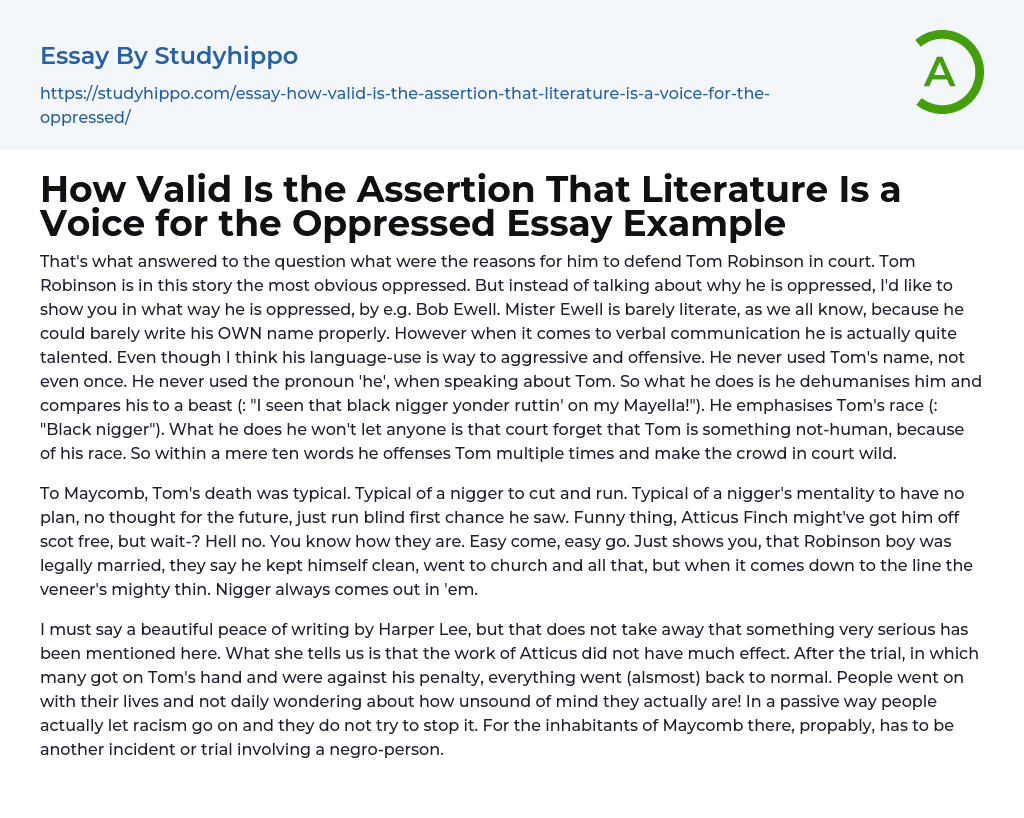

How Valid Is the Assertion That Literature Is a Voice for the Oppressed Essay Example
That's what answered to the question what were the reasons for him to defend Tom Robinson in court. Tom Robinson is in this story the most obvious oppressed. But instead of talking about why he is oppressed, I'd like to show you in what way he is oppressed, by e.g. Bob Ewell. Mister Ewell is barely literate, as we all know, because he could barely write his OWN name properly. However when it comes to verbal communication he is actually quite talented. Even though I think his language-use is way to aggressive and offensive. He never used Tom's name, not even once. He never used the pronoun 'he', when speaking about Tom. So what he does is he dehumanises him and compares his to a beast (: "I seen that black nigger yonder ruttin' on my
...Mayella!"). He emphasises Tom's race (: "Black nigger"). What he does he won't let anyone is that court forget that Tom is something not-human, because of his race. So within a mere ten words he offenses Tom multiple times and make the crowd in court wild.
To Maycomb, Tom's death was typical. Typical of a nigger to cut and run. Typical of a nigger's mentality to have no plan, no thought for the future, just run blind first chance he saw. Funny thing, Atticus Finch might've got him off scot free, but wait-? Hell no. You know how they are. Easy come, easy go. Just shows you, that Robinson boy was legally married, they say he kept himself clean, went to church and all that, but when it comes down to the line the veneer's mighty thin
Nigger always comes out in 'em.
I must say a beautiful peace of writing by Harper Lee, but that does not take away that something very serious has been mentioned here. What she tells us is that the work of Atticus did not have much effect. After the trial, in which many got on Tom's hand and were against his penalty, everything went (alsmost) back to normal. People went on with their lives and not daily wondering about how unsound of mind they actually are! In a passive way people actually let racism go on and they do not try to stop it. For the inhabitants of Maycomb there, propably, has to be another incident or trial involving a negro-person.
- Book Summary essays
- Metaphor essays
- Reader essays
- Rhyme essays
- Literary devices essays
- Villain essays
- Books essays
- Genre essays
- Literary Criticism essays
- Writer essays
- Protagonist essays
- Simile essays
- Poem essays
- Book Report essays
- Book Review essays
- Greek Mythology essays
- Plot essays
- Tragic Hero essays
- Coming of Age essays
- Play essays
- Rhetoric essays
- Rhetorical Question essays
- Translation essays
- Understanding essays
- Reason essays
- Character essays
- Letter essays
- American Literature essays
- Literature Review essays
- Utopia essays
- Poetry Analysis essays
- Dante's Inferno essays
- Between The World and Me essays
- Incidents in The Life of a Slave Girl essays
- Flowers for Algernon essays
- Myth essays
- Everyday Use essays
- Boo Radley essays
- Genesis essays
- Richard iii essays
- Alice in Wonderland essays
- On the road essays
- Ozymandias essays
- The Nightingale essays
- Holden Caulfield essays
- Animal Farm essays
- 1984 essays
- A Hanging essays
- Shooting An Elephant essays
- A Tale Of Two Cities essays



